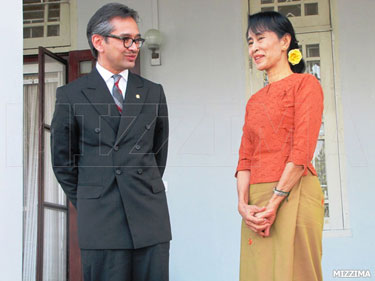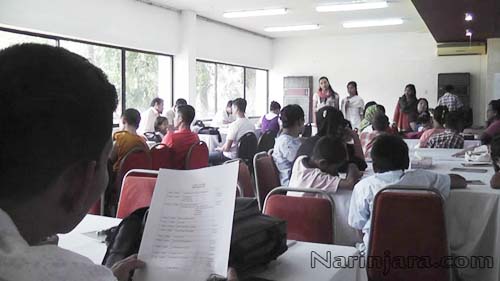
(Commentary) – The way the political game was played in 2011 will have a huge impact in 2012 Burma politics. 2011 was the year Burma took on a new political shape from dictatorship to quasi-civilian government. Right after the quasi-civilian Burmese government came in to power amid alleged fraud votes, the most powerful military chief, Senior Gen Than Shwe and Vice Senior Gen Maung Aye, were technically retired from their post.
Throughout 2011, the quasi-civilian Burmese government has continuously showed that it was changing and they were not the same with the previous government. It suspended controversial U$ 3.6 billion Myintsone dam project. It announced a peace offer to ethnic armed groups. President Thein Sein met with opposite leader Daw Aung San Suu Kyi. It relaxed media censorship somewhat. It granted amnesty including about 200 political prisoners. It secured the rotating Asean chair for 2014. It amended the political registration law, and the NLD left the 1990 elections result behind and re-registered as a political party. Some ethnic armed groups formed the UNFC to face the Burmese government. Burmese soldiers launched offensive wars against the KIA and SSA (N). It engaged in several talks with non-cease-fire groups and reached a ceasefire with UWSA, NDAA-ESS, SSA(S) and the DKBA, but UNCF members still are in talks with Burmese government. It formed the Myanmar National Human Rights Commission (MNHRC). Unlike previous Burmese governments, the quasi-civilian Burmese government officials including President Thein Sein’s advisors have interactions with domestic media, exile media and the foreign media. Also, many foreign diplomats such as US secretary Hillary Clinton were in and out in the country.
The reforms that it has taken may be fake or a strategic show or whatever in 2011, but it was welcomed with caution and calls for further change.
It is important to analyze the possible 2012 Burmese government policy based on what it has done in 2011. It changed political party registration law in 2011, and it shows it has the capacity of changing the rules or laws in future if it wants to do so. The so-called lower house and upper house are neither the real decision-makers nor lawmakers; they are instead just for democratic style show. In fact, President Thein Sein, Vice President Thiha Thura Tin Aung Myint and U Khin Aung Myint, and Thura Shwe Mann are the decision makers and the main players in the government body. Among them, President Thein Sein and Thura Shwe Mann will be popular again in 2012 as the moderate and reformer.
So, instead of trying to change something in those two houses of Parliament, Daw Aung San Suu Kyi and opposite groups should try to convince them, if they are elected as MPs and want to change any law or rule. Of course, finding asolution in those two houses is theoretical right, but it could be a waste of time since the main players are decision-makers and policy-makers rather than the upper house and lower house. It is the reality of how the Burmese government is functioning. Until the next general election, we will likely see the same Burmese government with the same leadership style.
If it granted amnesty to all of political prisoners including the 88-generation group in 2012, the democratic movement and national reconciliation process will move faster. 88-generation group members were in fact the de facto ones who organized the 8888 uprising and 2007 demonstration. It is important to note that many Burmese politicians and activists still believe people power is the only solution to end the era of dictatorship in Burma. Of course, the Arab spring successes were because of people power.
Without Daw Aung San Suu Kyi, change for Burma may look impossible and unimaginable, but Burmese people have the power to change Burma. They need to realize that they cannot depend on her alone to change the country, and then they can empower themselves and finally they can bring down the quasi-civilian government like the Arab spring ended dictators’ era in Tunisia, Egypt and Libya. If they wait for Daw Aung San Suu Kyi to change Burma, it be like watching a very long and boring movie without knowing when it will end. Daw Aung San Suu Kyi will not encourage mass demonstrations against the government as long as the relationship between her and government is good. Government officials likely will tell her to help them maintain tstability.
Daw Aung San Suu Kyi seems well prepared to promote her party campaign with the help of artists in 2012. She has met with many actors and actress, singers, composers and directors in 2011. Her road to Parliament will not be difficult one, but how much she can make difference in parliament is questionable because of 75 per cent USDP and 25 per cent military members.
Exiled political and human rights groups need to reassess how they should campaign in 2012 as their funders will likely turn to organizations inside Burma.
If the Burmese government granted amnesty to all of political prisoners in 2012, more and more exiles will return to Burma. Their return will significantly impact Burma politics inside and outside Parliament. Their return will mean very much for Burmese people and their country. However, they will face a hot debate with their opponents, who were never in exile, over why they left the country when it was bad if they enter into the Burmese political arena. It doesn’t mean they are not welcome, but it means they will face such challenges.
Burma tied with Afghanistan as the world’s second most corrupt nation. The culture of the corrupt society will be a continued challenge to government again in 2012. Anti-corruption will not end in Burma as long as no action against current and former government officials is taken. It could take at least a decade to end the corrupt culture in business and government offices. The most significant step for anti-corruption will be to bring corrupt upper echelons officials and their cronies to account, and the previous corrupt officials, including the then Senior-General Than Shwe and former Vice Senior Gen Maung Aye, to justice. It will also serve a very strong warning that no one is allowed to be corruptfor any reason. In 2012 or during his tenure, President Thein Sein will probably try to enforce his clean government and good governance policy that could bring them to justice. Otherwise, President Thein Sein speech on clean government and good governance in 2011 will not apply to anyone including the past and present corrupt officials.
Since Burma is the second poorest country in Asia, after Afghanistan, President Thein Sein’s poverty reduction effort can’t dramatically make changes as long as Western sanctions remain, as long as the corrupt culture in the country is not eradicated, and as long as the civil wars are not stopped in border areas.
The government’s peace offer to ethnic armed groups in 2011 could convince the UWSA, NDAA-ESS, SSA(S) and DKBA to sign cease-fire agreements, but the UNFC members including two of the strongest ethnic armed groups, the KIA and KNU, couldn’t reach cease-fire agreements, with the government. It shows that the Burmese government will likely reconsider its approach to non-ceasefire groups. The deal with ethnic armed groups, especially the UNFC members, will not be enough, and it must include a promising political dialogue with incentives. Probably, the UNFC members will continue talking with the government; but they will likely stick to the principles of the UNFC. It means each group can engage separately in talks with the government, but in order to reach the final peace agreement, they will likely remain united and tell the government to seek agreements through the UNFC. There is a possibility that the government will at least sit down with the UNFC to talk.
President Thein Sein may take a risk on his reform process, including a change of Burmese military leadership. That’s the risk that he must take if he really wants to work out his reform process.
The government will try to better its relationship with the international community, and to push to end Western sanctions in 2012, telling the international community including USA that its relationship with Daw Aung San Suu Kyi is smooth, and it has signed cease-fire agreements with some ethnic armed groups and it is still trying to sign cease-fires with non-ceasefire groups, it has released political prisoners, and it has improved its human rights record, so now is time to end their sanctions against Burma.
Burma politics is complicated, some even call it sick politics. The conflicts and ethnic issues also remain unresolved and civil wars will continue with human rights abuses. The government has a lot to do to improve its human rights record. On mainstream politics, Suu Kyi and her party are preparing to enter Parliament in 2012. She can be a political mentor and counselor who can push government officials for change in Burma. What will really happen in 2012 Burma politics is unpredictable. However, it is sure that there will be many things to follow during the 201 political game. 2012 will likely be the decisive year of Burma that determines if it really moves toward democracy or not.


